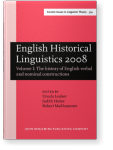“Þonne hate we hine morgensteorra”
On verb complementation in Old English
Traditional works on Old English syntax offer no explanation why verbs of naming could combine accusative and nominative complements. This paper offers such an explanation, based on an account of Old English verb complementation in terms of transitivity, copularity and status. transitivity is defined in terms of the number of internal arguments marked for oblique case (none, one or two), copularity in terms of the presence or absence of an internal argument in the nominative case, and status in terms of the presence or absence of an external argument of the verb marked for nominative case. By treating these features as dimensions rather than mutually exclusive categories (in particular transitivity and copularity), it becomes possible to account for combinations of internal arguments marked for nominative case and oblique case, such as þas þing þincað þam arasedum clericum unweorðlice (‘these things seem trivial to experienced clerks’) and þonne hate we hine morgensteorra (‘then we call it the Morning Star’), as well as for verbs of naming showing alternation between, on the one hand, a combination of accusative object and nominative complement, as in the previous example, and on the other hand two accusative objects, as in se steorra ... þone sume menn hatað þone fexedan steorran (‘the star ... which some people call the long-haired star’).
